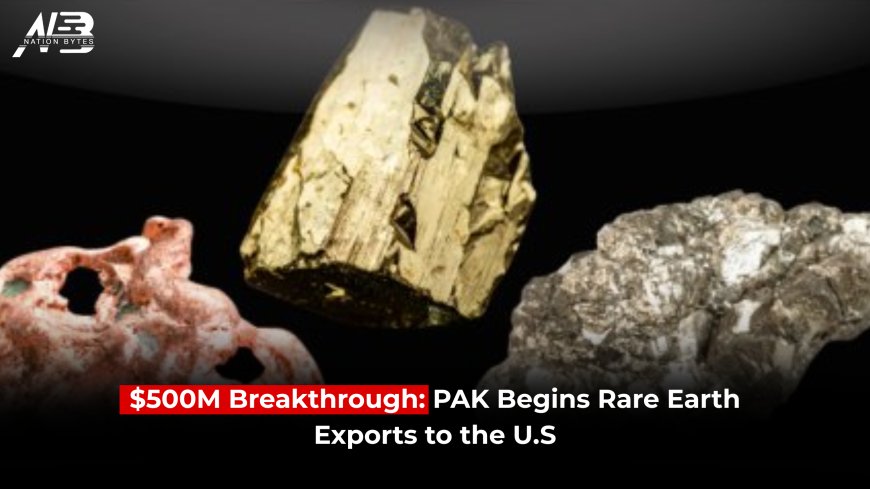$500M Breakthrough: PAK Begins Rare Earth Exports to the U.S
Pakistan delivers its first shipment of rare earth elements to the U.S. under a landmark $500 million deal with US Strategic Metals (USSM). The agreement marks a new era in Pakistan-U.S. strategic and economic relations, boosting critical mineral cooperation and industrial growth.

Strategic Significance of the Deal
The $500 million partnership represents more than a trade arrangement; it is a strategic step toward reshaping Pakistan’s economic and geopolitical footprint in the global minerals market.
The collaboration with USSM provides Pakistan with access to the global rare earth supply chain, which presents significant opportunities for economic growth, industrial modernization, and foreign investment.
For the United States, it strengthens efforts to secure independent access to critical materials, reducing reliance on a handful of dominant suppliers such as China.
“This is the first step in our exciting journey with the Frontier Works Organisation of Pakistan,” said Stacy W. Hastie, CEO of US Strategic Metals, in a statement. “Our goal is to provide critical minerals for U.S. industries while strengthening economic trade and friendship between our two nations.”
First Shipment Details
According to official reports, the first shipment includes:
-
Antimony used in semiconductors, batteries, and defense technologies.
-
Copper concentrate vital for electric vehicles, power infrastructure, and renewable energy systems.
-
Rare earth elements (REEs) containing neodymium and praseodymium, both essential components in high-performance magnets used in wind turbines, electric motors, and electronics.
These minerals were processed and enriched under the supervision of the Frontier Works Organisation (FWO) in partnership with local and international experts.
The materials will be analyzed and refined at USSM’s processing facilities in the United States before entering production for defense, clean energy, and advanced technology applications.
A Boost to Pakistan’s Mining and Industrial Sectors
The deal marks a turning point for Pakistan’s mining sector, which has long been recognized for its untapped potential. According to government estimates, Pakistan’s natural resource reserves are valued at over $6 trillion, including vast deposits of gold, copper, lithium, and rare earth elements.
Under the new framework, Pakistan and USSM will collaborate across the entire mineral value chain, including:
-
Exploration and geological mapping of rare earth deposits.
-
Beneficiation and concentrate production to enhance material purity.
-
Technology transfer and training for local specialists.
-
Establishment of refining and processing plants in Pakistan to increase local value addition.
Officials from the Ministry of Energy and the Ministry of Commerce have confirmed that the project will create thousands of skilled jobs, promote foreign direct investment (FDI), and position Pakistan as a key player in the global minerals economy.
Strengthening Pakistan-U.S. Economic Relations
This minerals deal also comes at a time of renewed economic diplomacy between Islamabad and Washington. Both countries are seeking to expand cooperation beyond traditional aid and security frameworks, focusing instead on trade, technology, and sustainable development.
The United States, under its Mineral Security Partnership (MSP) initiative, has been actively working to build resilient critical mineral supply chains with friendly nations. Pakistan’s participation marks a significant inclusion in this strategic network.
A senior official from Pakistan’s Ministry of Foreign Affairs commented:
“This partnership shows that Pakistan is ready to engage in high-value trade relationships based on transparency, innovation, and mutual benefit.”
He added that further agreements are expected in clean energy, climate resilience, and industrial modernization following this successful minerals collaboration.
U.S. Strategy: Diversifying Critical Mineral Sources
For Washington, this partnership is a crucial part of its broader strategy to reduce dependence on single-source suppliers for materials essential to defense, aerospace, and renewable energy sectors.
Rare earth elements, particularly neodymium, praseodymium, and dysprosium, are indispensable in the manufacturing of:
-
Electric vehicle (EV) motors
-
Wind turbine generators
-
Missile guidance systems
-
Satellites and radar technologies
By partnering with Pakistan, the U.S. aims to diversify its sourcing options while fostering industrial cooperation with a key ally in South Asia.
High-Level Oversight and Future Plans
The Pakistan-U.S. Critical Minerals Initiative is being overseen by a joint steering committee comprising representatives from Pakistan’s Ministry of Energy, Ministry of Commerce, the Frontier Works Organisation (FWO), and US Strategic Metals.
Officials say future phases of the partnership will include:
-
Establishing refining facilities in Balochistan and Khyber Pakhtunkhwa.
-
Introducing modern mining equipment and AI-based resource mapping systems.
-
Launching training programs for local geologists and engineers in collaboration with U.S. universities and research institutions.
Prime Minister Shehbaz Sharif has described the initiative as “a game changer for Pakistan’s economic diversification and energy transition goals.”
Economic and Environmental Impact
Experts believe the partnership could significantly boost Pakistan’s export revenues and strengthen its balance of payments. The project is expected to generate new employment opportunities, both in mining and in allied industries such as logistics, energy, and metallurgy.
Moreover, the initiative emphasizes sustainable extraction and environmental responsibility. Both partners have pledged to adopt green mining technologies and ensure a minimal environmental footprint throughout the supply chain.
A joint statement released after the first shipment emphasized that environmental standards would meet or exceed global benchmarks, aligning with the United Nations Sustainable Development Goals (SDGs).
Conclusion
Pakistan’s successful dispatch of its first shipment of rare earth elements and critical minerals to the United States marks the beginning of a transformational economic and strategic partnership.
The $500 million framework not only strengthens Pakistan-U.S. relations but also positions Pakistan as an emerging hub for global mineral exports, a sector poised to reshape the nation’s industrial future.

 Ateeq Ur Rehman
Ateeq Ur Rehman